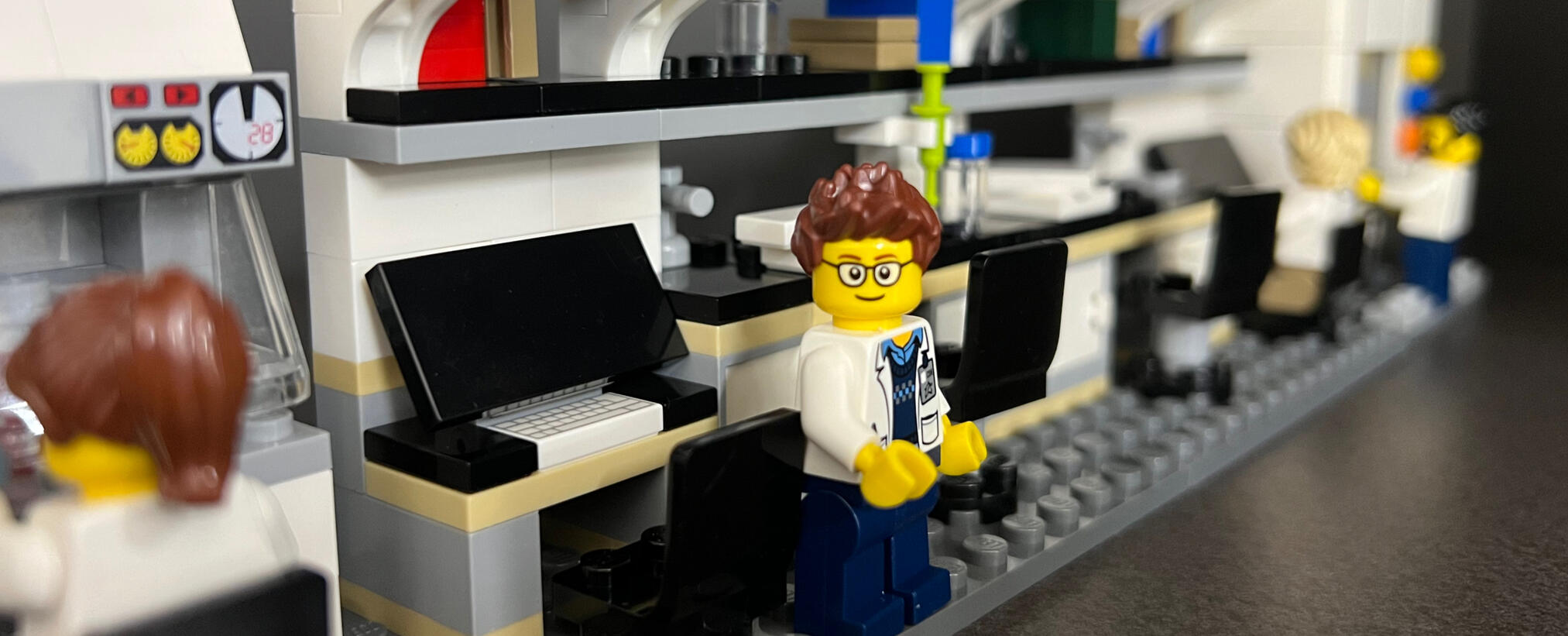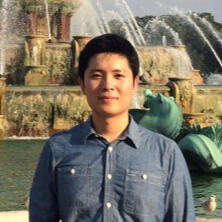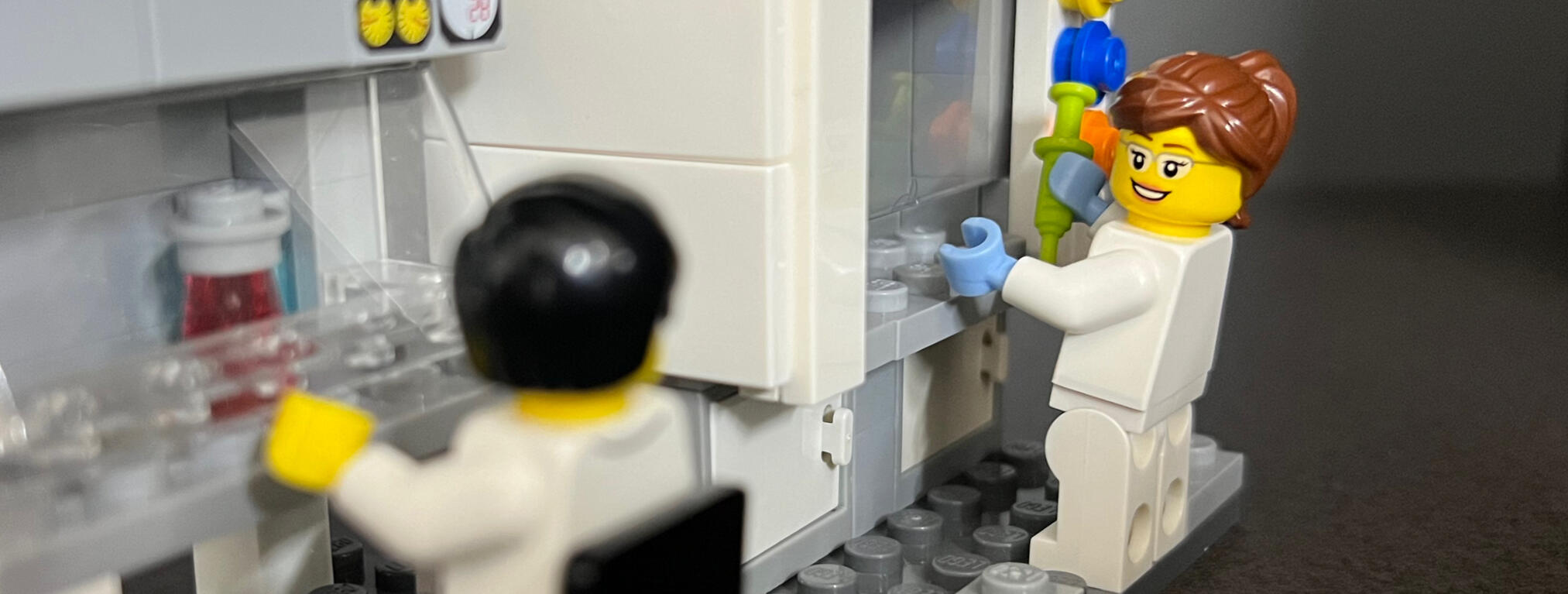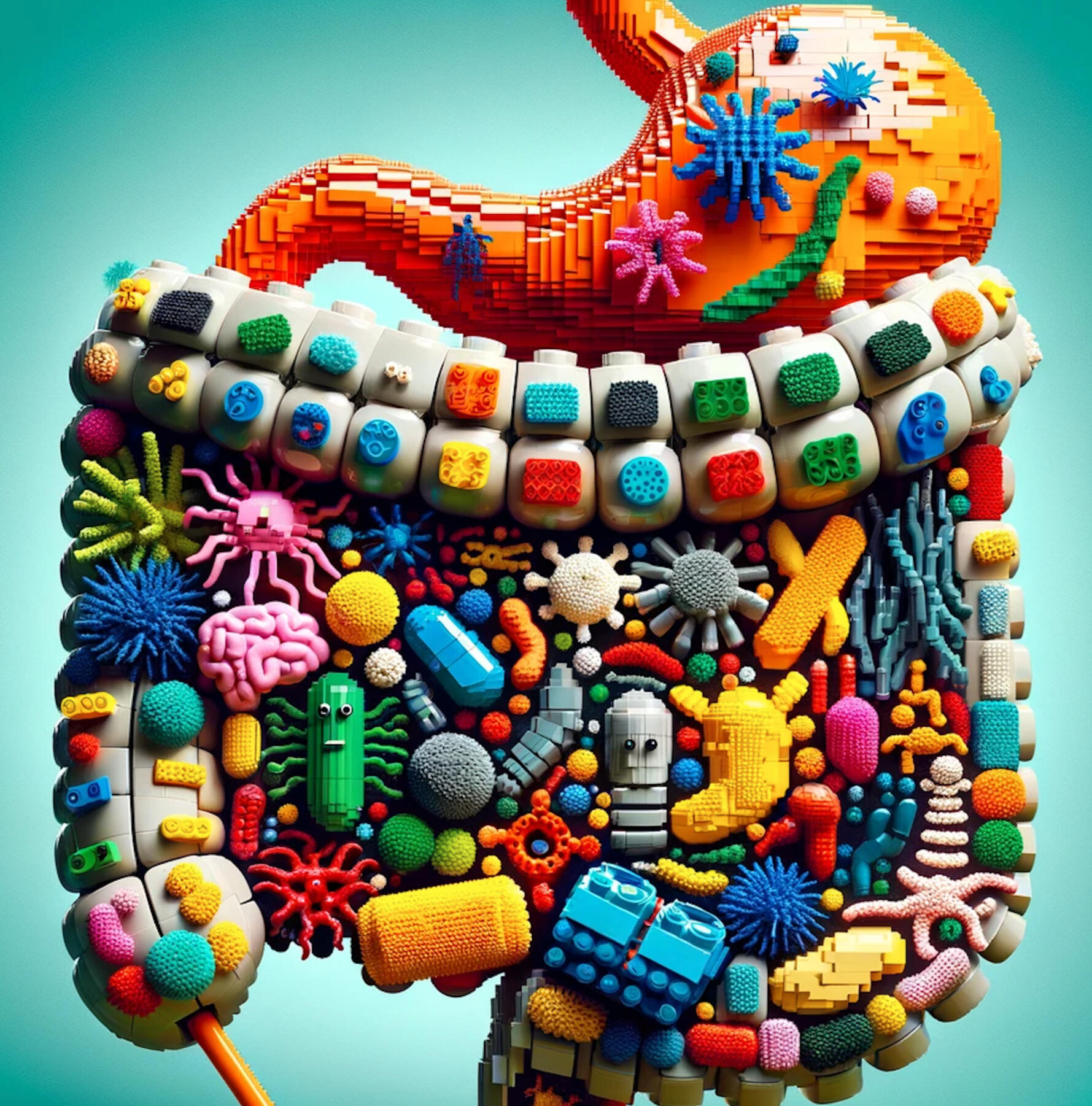
We work at the intersection of synthetic biology and computational biology to devise engineered microorganisms and biomaterials and assess their nutraceutical and precision medicinal efficacies. We are part of the Department of Integrative Biotechnology at Kookmin University.

We are currently recruiting graduate students. We also welcome inquiries from undergraduate students for research and training opportunities. If you are interested in our science, don't hesitate to get in touch with us.
Suryang Kwak, Ph. D.

Assistant professor
Kookmin University
77 Jeongneung-Ro, Seongbuk-Gu, Seoul 02707, Republic of Korea
Science Building 204-4 (Lab)
Hwirang Hall 503 (Office)Biosketch: skwak.link
Contact: skwak (at) kookmin.ac.kr
Highlighted Publications
Kwak et al. Dissection and enhancement of prebiotic properties of yeast cell wall oligosaccharides through metabolic engineering. Biomaterials. 2022;282:121379.
[pubmed] [hanbitsa]
Kwak, Mahmud, and Dantas. A tunable and expandable transactivation system in probiotic yeast Saccharomyces boulardii. ACS Synth Biol. 2021;11: 508-514.
[pubmed]
Kwak and Choi et al. Impact of investigational microbiota therapeutic RBX2660 on the gut microbiome and resistome revealed by a placebo-controlled clinical trial. Microbiome. 2020;8:125.
[pubmed] [hanbitsa]
Kwak et al. Production of biofuels and chemicals from xylose using native and engineered yeast strains. Biotechnol Adv. 2019; 37:271-283.
[pubmed] [hanbitsa]
We are working together in the lab with equity and respect!

Current Members
Principal Investigator
Suryang Kwak [skwak (at) kookmin.ac.kr]
Graduates
Seok Won [dnjs9998 (at) kookmin.ac.kr]
Chan Ho Kang [djj5634 (at) kookmin.ac.kr]
Hyeongwoo Park [98guddn (at) kookmin.ac.kr]
Chaeyeon Jin [wlscodus27 (at) kookmin.ac.kr]
Hyun Soo Song [soo980428 (at) kookmin.ac.kr]
Gayoung Yoon [ygy0113 (at) kookmin.ac.kr]
Yuri Jin [jinyurida (at) kookmin.ac.kr]
Alumni
Yujin Bang (M.S. Feb 2024)
Jeongyoon Choi (M.S. Aug 2025)
Kangmin Baek (M.S. Aug 2025)
I. Microbiome Restoration and Optimization

We assess the effects of probiotics, prebiotics, and microbiota-based interventions on the host microbiome. And we engineer probiotic chassis and prebiotic materials to understand their interactions with hosts better, maximize innate benefits, and minimize potential side effects. We also construct designer probiotics with novel functions to diagnose and remedy dysbiosis.In addition, we delve into the architecture of microbiome and metabolome in spontaneous food co-fermentation to precisely control the functionality and safety of fermented food products.
Links to key publications
Applied and Environmental Microbiology. 2016;82:2280-2287.
Microbiome. 2020;8:125.
ACS Synthic Biology. 2021;11:508-514.
Biomaterials. 2022;282:121379.
Journal of Microbiology and Biotechnology. 2025;35:e2411069.
II. Microbial Synthesis of Nutraceuticals

To synthesize unique nutraceuticals, we search through the genomic content of uncultivable microbial communities for genes encoding novel pathways. We also optimize microbial hosts in consideration of their peculiar phenotypes to maximize the productivity of nutraceuticals.Additionally, we diversify substrates to overcome native metabolic limits in the host platform. For instance, we expand the substrate availability of Saccharomyces yeasts toward xylose, a non-fermentable sugar, to produce nutraceuticals better by circumventing their strong ethanol-fermenting stance.
Links to key publications
Biotechnology Advances. 2019; 37:271-283.
Nature Communications. 2019;10:1356.
Biotechnology Journal. 2019;15:e1900173.
Biotechnology for Biofuels and Bioproducts. 2022;15:104.
Future Foods. 2025;12:100752
Our Sponsors and Collaborators

Bold names = Kwak Lab authors
! = Equal contribution
# = Corresponding author(s)
Peer-reviewed Publications
[45]
Moon JB, Kim H, Kwak S#, Seo J#. Novel endolysin from Streptococcus iniae-specific prophage selectively inhibits target bacteria. J Microbiol Biotechnol. 2025;35:e2508038[44]
Lee G!, Lee MH!, Park SE, Pak J, Bae S, Kwak S, Moon YH#, Son HS#. Prediction of irritable bowel syndrome by integrating urine metabolites and gut microbiota. Sci Rep. 2025;15:38246[43]
Pak J!, Park H!, Baek K, Son HS#, Kwak S#. Yeast-based precision fermentation for the biosynthesis of terpenoids. Future Foods. 2025;12:100752[42]
Yi HM!, Won S!,Pak J, Park SE, Kim MR, Kim JH, Park EY, Hwang SY, Lee MH, Son HS#, Kwak S#. Fecal microbiome and urine metabolome profiling of type 2 diabetes. J Microbiol Biotechnol. 2025;35:e2411071[41]
Kim JS, Pak J, Choi J, Park SE, Bae S, Cho H, Kwak S#, Son HS#. Factors influencing metabolite profiles in global Arabica green coffee beans: Impact of continent, altitude, post-harvest processing, and variety. Food Res Int. 2025;208:116187[40]
Won S!, Jeong Y!, Kim JE, Kim JH, Song HS, Bae HH, Kwak MS, Kim DK#, Sung MH#, Kwak S#. Evaluation of the safety and impact of heat-treated Lactiplantibacillus plantarum KM2 fermentation on gut microbiome architecture. J Microbiol Biotechnol. 2025;35:e2411069[39]
Kim D!, Park SE!, Pak J, Kim JY, Whon TW, Cho MK, Kwak S, Son HS#, Roh SW#. Effects of total microbiota-containing backslop from 450-day-fermented kimchi on microbe and metabolite dynamics. Food Chem. 2025;468:142420[38]
Rebeck ON!, Wallace MJ!, Prusa J!, Ning J, Evbuomwan EM, Rengarajan S, Habimana-Griffin LM, Kwak S, Zahrah D, Tung J, Liao J, Mahmud B, Fishbein SRS, Tovar ESR, Mehta R, Wang B, Gorelik MG, Helmink BA, Dantas G#. A yeast-based oral therapeutic delivers immune checkpoint inhibitors to reduce intestinal tumor burden. Cell Chem Biol. 2025;32:1-13[37]
Won S!, Kim EJ!, Park SE, Lee MH, Pak J, Kim K, Son HS#, Kim JH#, Kwak S#.
Exploring the characteristics of gut microbiota associated with depression via the depression assessment scales. J Microbiol Biotechnol. 2025;35:e2408042[36]
Lee DY, Kim EJ, Park SE, Cho KM, Kwon SJ, Roh SW, Kwak S, Whon TW#, Son HS#. Impact of essential and optional ingredients on microbial and metabolic profiles of kimchi. Food Chem.: X. 2024;22:101348[35]
Lee DY, Park SE, Kim EJ, Kim HW, Cho KM, Kwon SJ, Roh SW, Kwak S, Whon TW#, Son HS#.
A comparative study of the physicochemical, microbial, and metabolic profiling of kimchi during long-term fermentation under varying salinity conditions. LWT. 2024;196:115838[34]
Kwak S#. Therapeutic applications of native and engineered Saccharomyces yeasts. Fermentation. 2024;10:51[33]
Kwak S!, Crook N!, Yoneda A, Ahn N, Ning J, Cheng J, Dantas G#. Functional mining of novel terpene synthases from metagenomes. Biotechnol Biofuels Bioprod. 2022;15:104[32]
Kwak S, Robinson SJ, Lee JW, Lim H, Wallace CL, Jin YS#. Dissection and enhancement of prebiotic properties of yeast cell wall oligosaccharides through metabolic engineering. Biomaterials. 2022;282:121379[31]
Kwak S!, Mahmud B!, Dantas G#. A tunable and expandable transactivation system in probiotic yeast Saccharomyces boulardii. ACS Synth Biol. 2021;11: 508-514[30]
Lee JW, Kwak S, Liu JJ, Yun EJ, Jin YS#. 2’-Fucosyllactose production in engineered Escherichia coli with deletion of waaF and wcaJ and overexpression of FucT2. J Biotechnol. 2021;340:30-38[29]
Yun EJ, Seo SO, Kwak S, EJ Oh, Lee SH, Jin YS#, Kim KH#. Fast filtration with a vacuum manifold system as a rapid and robust metabolome sampling method for Saccharomyces cerevisiae. Process Biochem. 2021;110:195-200[28]
Wei LJ, Cao X, Liu JJ, Kwak S, Jin YS, Wang W, Hua Q#. Increased accumulation of squalene in engineered Yarrowia lipolytica through deletion of PEX10 and URE2. Appl Environ Microbiol. 2021;87:e0048121[27]
Kwak S!, Choi J!, Hink T, Reske KA, Blount K, Jones C, Bost MH, Sun X, Burnham CD, Dubberke ER#, Dantas G#. Impact of investigational microbiota therapeutic RBX2660 on the gut microbiome and resistome revealed by a placebo-controlled clinical trial. Microbiome. 2020;8:125[26]
Lee JW, Kwak S, Liu JJ, Yu S, Yun EJ, Kim DH, Liu C, Kim KH, Jin YS#. Enhanced 2'-fucosyllactose production by engineered Saccharomyces cerevisiae using xylose as a co-substrate. Metab Eng. 2020;62:322-329[25]
Park H, Jeong D, Shin M, Kwak S, Oh EJ, Ko JK, Kim SR#. Xylose utilization in Saccharomyces cerevisiae during conversion of hydrothermally pretreated lignocellulosic biomass to ethanol. Appl Microbiol Biotechnol. 2020;104:3245-3352[24]
Kwak S, Yun EJ, Lane S, Oh EJ, Kim KH, Jin YS#. Redirection of glycolytic flux enhances isoprenoid production in Saccharomyces cerevisiae. Biotechnol J. 2020;15:e1900173[23]
Kim HJ, Lee WH, Turner TL, Kwak S, Jin YS#. An extra copy of the β-glucosidase gene improved the cellobiose fermentation capability of an engineered Saccharomyces cerevisiae strain. 3 Biotech. 2019;9:367[22]
Sun L, Kwak S, Jin YS#. Vitamin A production by engineered Saccharomyces cerevisiae from xylose via two-phase in situ extraction. ACS Synth Biol 2019;8:2131-2140[21]
Liu JJ, Zhang GC, Kwak S, Oh EJ, Yun EJ, Chomvong K, Cate JHD, Jin YS#. Overcoming the thermodynamic equilibrium of an isomerization reaction through oxidoreductive reactions for biotransformation. Nat Commun. 2019;10:1356[20]
Kwak S, Jo JH, Yun EJ, Jin YS#, Seo JH#. Production of biofuels and chemicals from xylose using native and engineered yeast strains. Biotechnol Adv. 2019; 37:271-283[19]
Oh EJ, Wei N, Kwak S, Jin YS#. Overexpression of the RCK1 improves acetic acid tolerance in Saccharomyces cerevisiae. J Biotechnol. 2019;292:1-4[18]
Yun EJ, Liu JJ, Lee JW, Kwak S, Yu S, Kim KH#, Jin YS#. Biosynthetic routes for producing various fucosyl-oligosaccharides. ACS Synth Biol. 2019;8:415-424[17]
Yu S, Liu JJ, Yun EJ, Kwak S, Kim KH#, Jin YS#. Production of a human milk oligosaccharide 2'-fucosyllactose by metabolically engineered Saccharomyces cerevisiae. Microb Cell Fact. 2018;17:101[16]
Yun EJ, Oh EJ, Liu JJ, Yu S, Kim DH, Kwak S, Kim KH#, Jin YS#. Promiscuous activities of heterologous enzymes in Saccharomyces cerevisiae engineered to assimilate various sugars from renewable biomass. Biotechnol Biofuels. 2018;11:140[15]
Liu JJ, Kwak S, Pathanibul P, Lee JW, Lim H, Yu S, Yun EJ, Kim KH, Jin YS#. Biosynthesis of a functional human milk oligosaccharide, 2’-fucosyllactose and its precursor L-fucose, using Saccharomyces cerevisiae. ACS Synth Biol. 2018;7:2529-2536[14]
Kim DH, Kim IJ, Yun EJ, Kwak S, Jin YS#, Kim KH#. Metabolic engineering of Saccharomyces cerevisiae by using the CRISPR-Cas9 system for enhanced fatty acid production. Process Biochem. 2018;73:23-28[13]
Wei LJ, Kwak S, Liu JJ, Lane S, Hua Q, Kweon DH, Jin YS#. Improved squalene production through increasing lipid contents in* Saccharomyces cerevisiae*. Biotechnol Bioeng. 2018;115:1793-1800[12]
Oh EJ, Kwak S, Kim HJ, Jin YS#. Transporter engineering for cellobiose fermentation under lower pH conditions by engineered yeast. Bioresour Technol. 2017;245:1469-1475[11]
Kwak S, Jin YS#. Production of fuels and chemicals from xylose by engineered Saccharomyces cerevisiae: a review and perspective. Microb Cell Fact. 2017;16:82[10]
Kwak S, Kim SR, Xu H, Zhang GC, Kim H, Lane S, Jin YS#. Enhanced isoprenoid production from xylose by engineered Saccharomyces cerevisiae. Biotechnol Bioeng. 2017;114:2581-2591[9]
Xia PF, Zhang GC, Walker B, Seo SO, Kwak S, Liu JJ, Kim H, Ort DR, Wang SG, Jin YS#. Recycling carbon dioxide during xylose fermentation by engineered Saccharomyces cerevisiae. ACS Synth Biol. 2017;6:276-283[8]
Xia PF, Zhang GC, Liu JJ, Kwak S, Tsai SC, Kong II, Sung BH, Sohn JH, Wang SG, Jin YS#. GroE chaperonins assisted functional expression of bacterial enzymes in Saccharomyces cerevisiae. Biotechnol Bioeng. 2016;113:2149-2155[7]
Liu JJ, Kong II, Zhang GC, Jayakody LN, Kim H, Xia PF, Kwak S, Sung BH, Sohn JH, Walukiewicz HE, Rao CV, Jin YS#. Metabolic engineering of a probiotic Saccharomyces boulardii. Appl Environ Microbiol. 2016;82:2280-2287[6]
Zhang GC, Liu JJ, Kong II, Kwak S, Jin YS#. Combining C6 and C5 sugar metabolism for enhancing microbial bioconversion. Curr Opin Chem Biol. 2015;29:49–57[5]
Yun EJ, Kwak S, Kim SR, Park YC, Jin YS#, Kim KH#. Production of (S)-3-hydroxyburate by metabolically engineered Saccharomyces cerevisiae. J Biotechnol. 2015;209:23-30[4]
Kim SM, Guo J, Kwak S, Jin YS, Lee DK, Singh V#. Effects of genetic variation and growing condition of prairie cordgrass on feedstock composition and ethanol yield. Bioresour Technol. 2015;183:70-77[3]
Tsai CS, Kwak S, Turner TL, Jin YS#. Yeast synthetic biology toolbox and applications for biofuel production. FEMS Yeast Res. 2015;15:1-15[2]
Thompson A, Kwak S, Jin YS#. Squalene production using Saccharomyces cerevisiae. i-ACES. 2014;1:57-63[1]
Kwak S, Park YC#, Seo JH#. Biosynthesis of 3-hydroxypropionic acid from glycerol in recombinant Escherichia coli expressing Lactobacillus brevis dhaB and dhaR gene clusters and E. coli K-12 aldH. Bioresour Technol. 2013;135:432-439
Patents
[4]
Dantas G, Kwak S, Virgin H. Engineered microorganisms and methods of making and using same. WO 2020/061389. 2020.[3]
Jin YS, Liu JJ, Yu S, Yun EJ, Kwak S, Kim KH, Lee J. Engineered microorganisms for production of 2' fucosyllactose and l-fucose. WO 2019/222391. 2019.[2]
Seo JH, Park YC, Kwak S, Park SH, Raj SM, Rathnasingh C. Method for production of 3-hydroxypropionic acid from glycerol by cultivating recombinant E. coli. KR 10-1048151-0000. 2009.[1]
Seo JH, Park YC, Kwak S, Park SH, Raj SM, Rathnasingh C. Method of culturing recombinant E. coli to simultaneously produce 3-hydroxypropionic acid and 1,3-propanediol from glycerol. KR 10-1048485-0000. 2009.